
Four is the fourth album by American rock band Blues Traveler, released on September 13, 1994. Blues Traveler broke into the mainstream following the release of four.

"Aneurysm" is a song by the American rock band Nirvana, written by vocalist and guitarist Kurt Cobain, bassist Krist Novoselic, and drummer Dave Grohl. It first appeared as a B-side on the band's breakthrough "Smells Like Teen Spirit" single in September 1991. A second studio version was released on the rarities compilation Incesticide in December 1992.
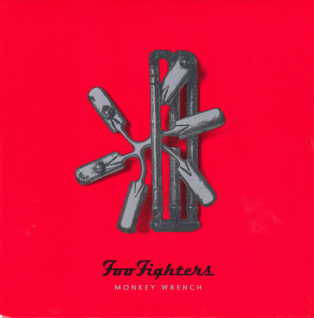
"Monkey Wrench" is a song by American rock band Foo Fighters. It was released as the lead single from their second album, The Colour and the Shape. The lyrics chronicle the 1997 disintegration of singer/songwriter Dave Grohl's four-year marriage to Jennifer Youngblood. The song peaked at number 9 on the Billboard Mainstream Rock Tracks chart, and at number 12 on the UK Singles Chart.
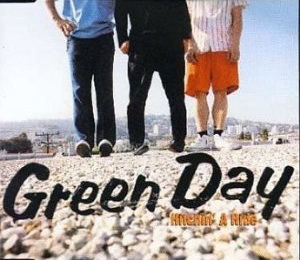
"Hitchin' a Ride" is a song by American rock band Green Day. It was released in September 1997 as the first single from their fifth album, Nimrod, and is the second track on the album. The single reached number five on the US Billboard Modern Rock Tracks chart, number nine on the Billboard Mainstream Rock chart, and number 25 on the UK Singles Chart.
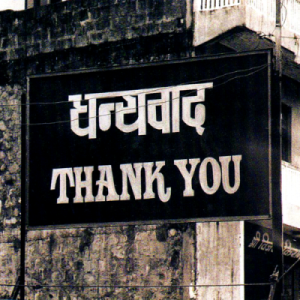
"Thank U" is a song by Canadian-American recording artist and songwriter Alanis Morissette from her fourth studio album, Supposed Former Infatuation Junkie (1998). The song was written by Alanis Morissette and Glen Ballard, who produced her previous album, Jagged Little Pill (1995). Morissette wrote the song after she came back from a trip to India. Maverick and Reprise Records released the song as a single on October 12, 1998.
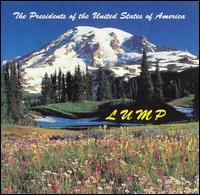
"Lump" is a song by alternative rock band the Presidents of the United States of America. It was released in August 1995 by Columbia Records and included on their album The Presidents of the United States of America (1995). The song reached number one on the US Billboard Modern Rock Tracks chart the same year. Composer Chris Ballew said that the lyrics combined his own history of having a benign tumor in the head with a vision he had of a woman in a swamp, while employing the word "lump" because Ballew was fond of it. The musical part was described by Ballew as him "trying to write a Buzzcocks song". Ballew considers it his favorite composition. The music video for the song was directed by Roman Coppola. "Lump" has been covered or remade by several artists, including the Johnstones and "Weird Al" Yankovic.

"Fly" is a song by American rock band Sugar Ray. It appears on their 1997 album Floored twice: one version with reggae artist Super Cat and the other without. The song was serviced to US radio in May 1997.

"Smooth" is a song performed by American rock band Santana and Rob Thomas of Matchbox Twenty, who sings the lead vocals. It was released on June 15, 1999, as the lead single from Santana's 1999 studio album, Supernatural. It was written by Itaal Shur and Thomas, who re-wrote Shur's original melody and lyrics, and produced by Matt Serletic.
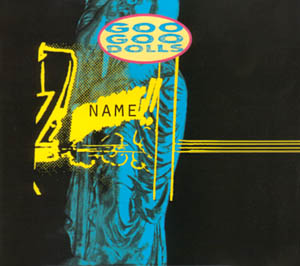
"Name" is a song by American rock band Goo Goo Dolls. It was released in September 1995 as the third single from their fifth studio album, A Boy Named Goo (1995). "Name" became the band's first major hit, topping both the US Modern Rock Tracks chart and the Album Rock Tracks chart. It also reached number five on the Billboard Hot 100. In Canada, "Name" peaked at number two on the RPM 100 Hit Tracks chart and number one on the RPM Alternative 30.

"If It Makes You Happy" is a song by American singer-songwriter Sheryl Crow, released as the lead single from her 1996 eponymous album in September 1996. The song peaked at number 10 on the US Billboard Hot 100, becoming Crow's final top-10 solo hit in the United States, and at number nine on the UK Singles Chart. It also reached number one in Canada and won Best Female Rock Vocal Performance at the 1997 Grammy Awards. In 2003, Q Magazine ranked "If It Makes You Happy" at number 663 in their list of the "1001 Best Songs Ever".
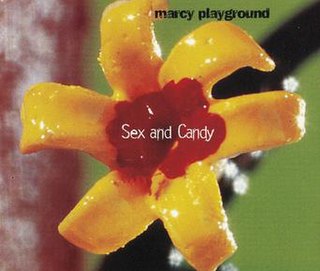
"Sex and Candy" is a song by American alternative rock group Marcy Playground, a single from their 1997 self-titled debut album. It is a post-grunge song with psychedelic elements. Lead singer John Wozniak was inspired to write the song after a woman told him that a room smelled like "sex and candy." The song's abstract lyrics refer to the disco era and include hippie lingo. In 1997, Wozniak said that "Sex and Candy" is an unorthodox love song; later, he said he does not know what the song means. It was released to radio on the week of September 15, 1997.

"Slide" is a song by American alternative rock group Goo Goo Dolls. It was released as the first single from their sixth studio album, Dizzy Up the Girl, in September 1998. According to lead guitarist John Rzeznik, the song is about a Catholic girl who becomes pregnant and discusses with her boyfriend how they should respond to it. Musically, the track is a jangle pop and alternative rock song.

"Run-Around" is a song by American rock band Blues Traveler, featured on their fourth studio album, Four (1994). The song was the band's breakthrough hit, peaking at number eight on the US Billboard Hot 100 and number 13 on Canada's RPM 100 Hit Tracks chart. It gave the band their first Grammy Award in 1996, for Best Rock Vocal Performance by a Duo or Group.

"Standing Outside a Broken Phone Booth with Money in My Hand" is a song by American alternative rock group Primitive Radio Gods. Their debut single, it was released from the soundtrack to the 1996 black comedy film The Cable Guy and was also included on the band's first album, Rocket. Its chorus consists of a sample from the 1964 B.B. King song "How Blue Can You Get", and the enigmatic lyrics of the song describe a troubling relationship in which two people cannot connect on an emotional level. The song was released in the United Kingdom on March 18, 1996, and was serviced to US radio on June 11, 1996.

"Only Wanna Be with You" is a song by American alternative rock band Hootie & the Blowfish. After being included on the group's EP Kootchypop (1993), it was released in July 1995 as the third single from their breakthrough album, Cracked Rear View (1994). It peaked at number six on the US Billboard Hot 100, number one on the Billboard Top 40/Mainstream chart, number three on the Billboard Adult Contemporary chart, and number two on the Billboard Album Rock Tracks chart.
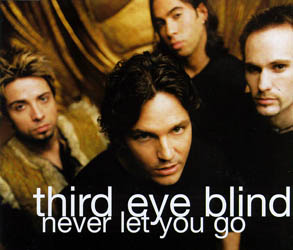
"Never Let You Go" is a song by American rock band Third Eye Blind. It was released on January 4, 2000, as the second single from their second album, Blue. The song peaked at number 14 on the US Billboard Hot 100 and spent three weeks at number one in Canada. It also reached number 26 in Iceland, number 15 in New Zealand, and number six on the UK Rock Chart.

"You Wanted More" is a song by Los Angeles band Tonic that originally appeared in the 1999 film American Pie. It was released on June 7, 1999, and was also featured on Tonic's second album, Sugar, released later in the year. The single peaked at number three on the US Billboard Bubbling Under Hot 100 chart and reached the same position on the Billboard Mainstream Rock Tracks chart, as well as on the Canadian RPM Rock Report.

"Follow You Down" is a song by American rock band Gin Blossoms, and the first single released from their album Congratulations I'm Sorry. It was released as a double A-side single with "Til I Hear It from You" in the United States. The song received a fair amount of radio play and has been featured in several films, including How to Lose a Guy in 10 Days. It reached number nine on the US Billboard Hot 100 in a 46-week stay on the chart. It also became the band's second number-one single in Canada, after "Til I Hear It from You", and reached number 30 in the United Kingdom.

"Back to You" is a song by Canadian singer Bryan Adams, written by Adams and Eliot Kennedy. It was released in December 1997 as a live acoustic version for Adams' album MTV Unplugged and features students from the Juilliard School, conducted by Michael Kamen. Upon its release, the song became Adams' ninth number-one single in his home country, staying at number one on the RPM Top Singles chart for three nonconsecutive weeks, and reached the top 40 in Australia, Hungary, Iceland, and the United Kingdom. It was later included on his compilation albums The Best of Me and Anthology.
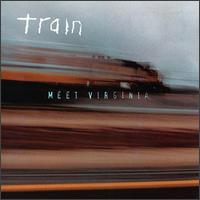
"Meet Virginia" is the debut single of American roots rock band Train, released in 1998 from their self-titled debut album. Originally serviced to adult album alternative radio in March 1998, the song took over a year to gain popularity on mainstream radio, eventually reaching number 20 on the US Billboard Hot 100 chart in January 2000, becoming Train's first top-20 hit and their first single to appear on the Hot 100. It also reached the top 20 in Canada, peaking at number 15 on the RPM 100 Hit Tracks chart.




















